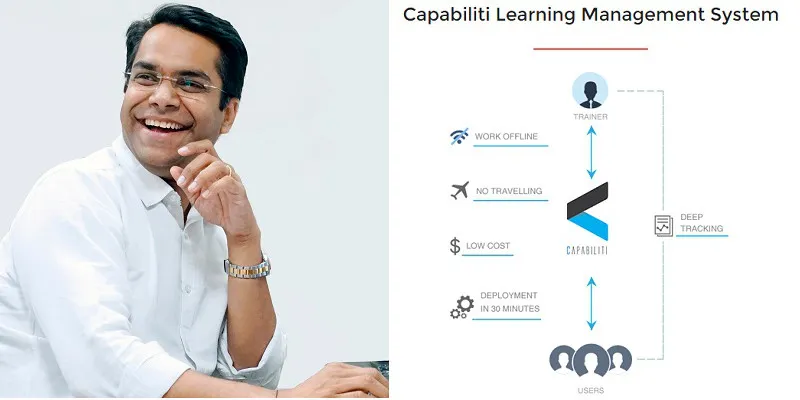How Capabiliti’s mobile platform helps enterprises train distributed users
Mrigank Tripathi is a seasoned entrepreneur. YourStory covered the beginning of his entrepreneurial journey with Voicetap Technologies back in 2009. They were one of the first people to move towards mobile learning for the end users. Voicetap setup m-learning platforms for Airtel, Vodafone and Tata Docomo and from that experience, they realised that reaching end users as a VAS (Value Added Service) isn’t the most effective. “We stopped doing that but I have always believed that the mobile would help bring learning to anyone, anywhere,” says Mrigank. Voicetap became Applied Mobile Labs and reached profitability but the first solution Mrigank had found had again become relevant after a few years.
“I was sitting with the L&D head of a company – and he mentioned how difficult, expensive and largely ineffective it was to train their distributed user base across India,” says Mrigank. He proposed that the company could use their platform and the company ended up reducing their training cost by 80 per cent, and getting 1,500 people trained in one-fifth the time taken, with 85 per cent getting certified. Thus Qustn and the platform Capabiliti were born.

Capabiliti is a mobile-first SaaS platform which helps companies, institutes and governments train, assess and engage with remote workers. “We bring the frontline into the main fray without the difficulties involved with other companies and help companies reduce costs while enhancing productivity of the frontline staff,” says Mrigank. There were ancillary advantages as well – with the frontline users directly being trained on the correct messaging, complaints dropped, and dealing with any backlash on social media. Since then, the company has been firing on all cylinders with Capabiliti. (the company is also one of YourStory's Tech30)
“Within one year of the launch, Qustn has seen over 7,00,000 transactions. We now have several category leaders including Airtel, Indus Towers, Shopclues, Flipkart and others as customers,” says Mrigank. We recently launched a SaaS-based offering, where companies of all sizes (startups, midsized companies and enterprises alike) can log on and start using the platform. Qustn has also raised $3,90,000 from 500 startups and seasoned investors like Rajan Anandan to solve the problem of training remote users.
Digital training platforms aren’t new. Mobile-enabled training platforms exist in the West but the story changes when one talks about mobile first. “Mobile enabled and mobile first are two different things and require a fundamentally different approach. We followed the mobile-first approach: we built the mobile version first, and then took that onto the web,” says Mrigank. Capabiliti tackles the problems of poor data coverage, app size, types of handsets, encoding etc., automatically. These features are important when one is talking about a distributed user base.
In terms of revenue, for smaller, more defined enterprises, Capabiliti has a licence-based model, where they charge companies on a per user basis per month. For larger enterprises, they have a convertible licence model – which gives enterprises significant advantage for larger numbers.
A big challenge in this segment is the availability of digital content. Most companies don’t have video-based content or training which they can give to the end users directly. Capabiliti allows any type of content to come onto the platform (PPT, video, text, images), and their platform automatically converts/encodes/processes the content for mobile/web based rendering.
Capabiliti comes in the talent management space which is big with companies like Oracle, PeopleStrong, SAP and others dabbling in the space. “We are in the space adjacent to it, which is talent management for distributed users. This segment is five times the normal talent management space, as fundamentally in any company the number of employees to remote users is usually 1:5,” says Mrigank. Companies like CornerstoneOnDemand, Wooqer, Drona Mobile, Go Sales Train, Handy Train also play a role in this growing sector.
For Qustn, the growth has been promising as the company grew 700 per cent in the past six months. “We have a fairly robust product roadmap, and will be releasing new features regularly. Our first pit-stop was to allow any company to go from nothing to being mobile training enabled in 30 minutes flat, and now that this exists, we are moving onto other things such as simulations, roleplay etc,” says Mrigank.
Website: Capabiliti







